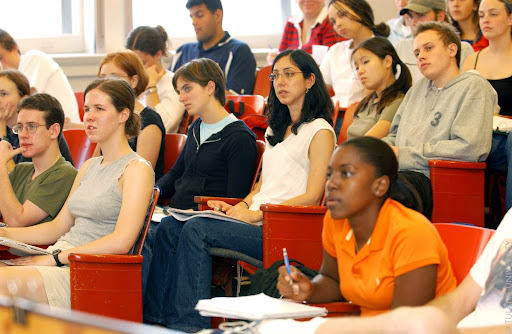After a brief perusal of the now infamous APSA report (I initially thought my friend had just misspelled “ASAP” in his forwarded email; turns out this is a real thing), I’ve concluded that the committee does a phenomenal job of implementing exactly one half of the College’s core value of stewardship: “We are committed to making decisions that will ensure the long-term survival of this institution.”
Despite flipping the cover page ready to be outraged, I found the APSA report thoughtful and measured, if haphazardly researched. I hope folks will give the document the benefit of a full reading instead of simply parroting the selective excerpts circulating on the Internet.
But alas for the APSA report, the declaration of stewardship continues: “We must maximize the value of our human, financial and physical resources in ways consistent with our Quaker heritage.”
The APSA’s otherwise thoughtful evaluations included a laughable evaluation of our esteemed campus ministers. The committee laid out two specific prescriptions:
Prescription #1: Stop doing so much off-campus ministry and focus instead on the physical Guilford campus.
Before moving onto Prescription #2 — the one which primarily concerns this editorial — it’s worth noting that such a recommendation is akin to asking the geology department to stop their Appalachian trips because, like, why can’t they just study the rocks on Guilford’s campus?
Prescription #2: “Given our current economic constraints and need to reduce costs, we recommend elimination (sic) of the position created and previously funded by the Lilly grant which is now being funded by the College budget. “
I imagine most folks’ thought process on reading this sentence mirrored my own: “Oh yeah, well, if there isn’t enough money then I guess…OH SWEET JESUS THAT’S FRANK MASSEY.”
It’s hard to imagine the elimination of Frank’s position as being consistent with Quaker values except in the most liberal applications of the transitive property.
Normally, this would be the spot in an editorial where one extols the positive qualities of the person in question and relates short anecdotes showing their humor or wisdom. But if you’re reading this, you’re probably a member of the Guilford community, which means you’re also already aware that Frank is one of the wiser, funnier and more compassionate people you know. So if it’s all the same to you, I’m just going to skip to the part where Guilford doesn’t eliminate his position. Cool? Cool.
Even the most preliminary readings of APSA’s methodology bear a little light (though not of the inward variety) on how they might have reached such a counterintuitive decision. Notably, they apply the same rubric to grading both Campus Ministry and, for example, the Professional Development and Training Center. Imagine the giggle Max must have let out in The Hut when he sat down to type an answer to this question:
“5b. What are the quality indicators for measuring success in your program, such as peer data, benchmark data, and/or internal historical data, and how does your program compare? In comparison, is your program doing better or worse?”
You would think the latter question was implicitly asked in the former, but grammatical issues aside, it’s the “such as” that ought to make you chuckle. Frank being a good deal more intelligent than me, I don’t know exactly how he defines success in his “program,” but my hunch is it has more to do with spiritual seeking than benchmark data. By a metric along the lines of “lives transformed per hour worked,” Frank would be phenomenally overqualified for his position.
In fairness to APSA, such a metric is admittedly difficult to measure. Guess what? So is a liberal arts education. But our institution stands on the belief that such ethereal skills are central to the human experience, and worth learning and cultivating for the good of ourselves and society at large.
But in evaluating Campus Ministry, APSA instead retains their usual penchant for statistics and finances. Though they claim this is not the only rationale behind their recommendation to remove Frank’s position, APSA notes that “the average staffing for campus ministry centers is 1.4 among the 10 Quaker colleges in the United States,” whereas Guilford has three full-time faculty devoted to ministry.
One way of interpreting that data is to say, “Oh my God, we have 1.6 too many ministers.” Another way is to say, “Hey, we’re better at meeting the spiritual needs of our students than nine other Quaker institutions. Go team.”
If Guilford decides to define itself in relation to “peer institutions” and “aspirants,” and expects students to do the same, almost inevitably we’ll always come out behind. Our faculty-student ratios lag behind those of our “peers,” our test scores are lower and our endowment is far too small to support our myriad academic and social endeavors.
But if instead Guilford chooses to define itself by the talented and quirky members of its community, and on the laughing wisdom exchanged when they are gathered together, suddenly there are few more alluring places to spend four transformative years engaged in becoming a better human. The Spirit for which Frank provides a daily vessel is worth more in retention than all the glitzy marketing plans our admissions folks can formulate.
Hard financial decisions must be made, and they will be. Beloved faculty will undoubtedly be let go, treasured programs cut. But if Guilford still claims to be in the business of transforming lives, then there is no more fiscally responsible option than to retain Frank Massey as a campus minister. Dollar for dollar, no one is more valuable than the man we already employ.
A Friends Meeting in financial straits no less dire than the ones facing Guilford once called an emergency budget meeting to discuss slashing their budget in order to survive. After tense hours of silence, debate, discussion and further silence, a woman called a man’s abundant budget proposal foolish. The man responded, “Sometimes, the Spirit calls for foolishness.”
If I have learned nothing else from Frank, it is that sometimes the Spirit calls for foolishness. And when it beckons, who are we to impede its work?
Andrew Taylor graduated from
Guilford in December 2011.






Courtney Mandeville • Oct 1, 2013 at 11:55 am
Friends speak my mind. Great article Andrew.
Thanks Frank for all you’ve done.
Cate • Sep 29, 2013 at 10:02 am
This is the most eloquent, factually-supported, moving, and thoughtful piece I have ever read in The Guilfordian — and maybe in general. Many thanks to the author. Friend speaks my mind entirely.
I love you, Frank Massey. Thank you for all that you’ve done to improve my life.